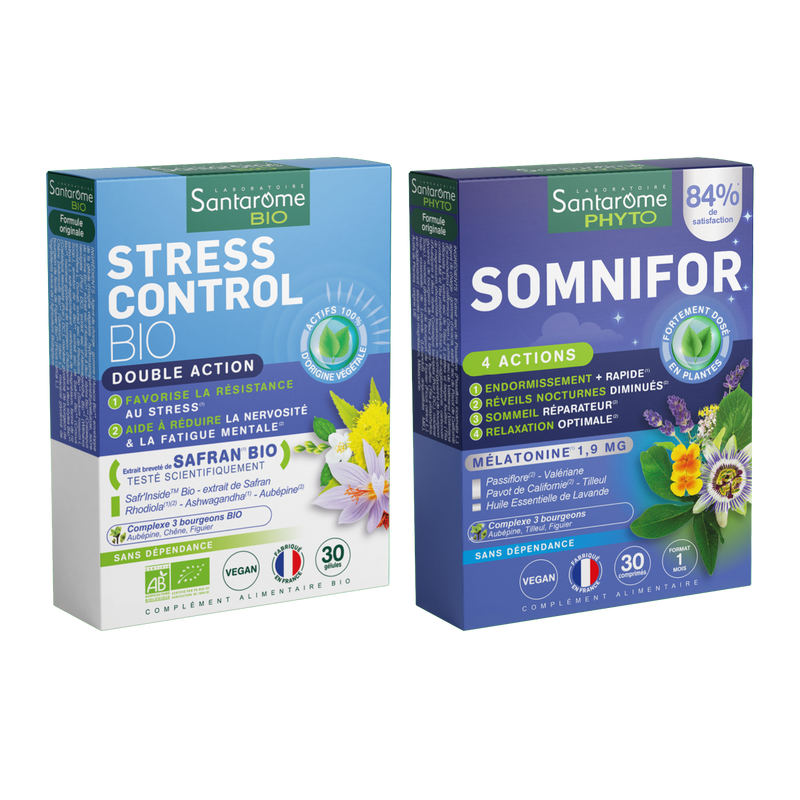What is deep sleep?
Written on 04/27/2025 by Pauline de Santarome
Deep sleep is one of the four stages of the sleep cycle, and it is during this stage that the body, muscles, and brain are most relaxed. Want to improve the quality of your sleep? Then this article is for you!

Deep sleep: the most restorative phase of sleep
While we sleep, our brain goes through different phases: falling asleep, light sleep, deep sleep, and REM sleep. Deep sleep is one of the most important stages. It is essential for our circadian rhythm.
During light or REM sleep, the brain is active, breathing is irregular, and the eyes move rapidly. It is during REM sleep that dreams occur. Deep sleep, on the other hand, differs from other stages of sleep in its depth and intensity. It is characterized by a slow heart rate, relaxed muscles, and an almost complete absence of movement.
The benefits of deep sleep
Deep sleep is crucial for physical and mental health, as it allows the body to regenerate and prepare for a new day. Here are some of its benefits:
Physical recovery: During deep sleep, the body undergoes a powerful regeneration process that helps heal and restore muscles. After physical activity, deep sleep can help reduce pain and soreness by allowing the body to rebuild damaged muscle tissue. Deep sleep provides the body with the energy and rest it needs to stay healthy and fit.
Improved memory and cognitive abilities: during deep sleep, the brain consolidates information, memories, and learning absorbed during the day. Cerebrospinal fluid removes accumulated toxins, including beta-amyloid protein, which is partly responsible for Alzheimer's disease.
Mood regulation: Chronic lack of deep sleep can have a negative impact on mood and trigger anxiety disorders, depression, stress, and irritability.
Strengthening the immune system: during this phase, the body produces cytokines—proteins that help fight infection, inflammation, and stress. Deep sleep also reduces the risk of certain chronic diseases such as diabetes, obesity, and heart disease.
Factors that affect deep sleep
Do you have trouble falling asleep or enjoying long, restful nights? Lack of sleep can have serious consequences for your physical and mental health. There are many reasons why you might have trouble sleeping:
Stress causes an increase in brain activity and cortisol production.
An unbalanced diet. Certain dietary and lifestyle habits, such as caffeine consumption, smoking, and alcohol consumption, can interfere with restful sleep.
Illness or certain medications can affect sleep, particularly antidepressants or sleeping pills.
Noise and blue light also increase brain activity and cause nighttime awakenings.
Sleep disorders such as sleep apnea, restless legs syndrome, and insomnia can reduce the amount and quality of deep sleep.
By adopting a better approach, you can enjoy longer, more restful nights and wake up feeling refreshed and ready to face the day.
Plants to improve sleep quality
For centuries, plants have been used as natural remedies to improve sleep quality. From chamomile to California poppy, certain plants help calm the senses and promote relaxation, contributing to more restful sleep. Among the most popular plants are:
Hawthorn is known for its calming effects on the nervous system. It is often used to reduce anxiety and agitation, which are often factors contributing to poor sleep quality.
Valerian has sedative properties. It is particularly useful for people suffering from sleep disorders.
Passionflower acts on anxiety, nervousness, and distress. Its relaxing properties prepare you for sleep and help you fall back asleep if you wake up during the night.
Escholtzia, or California poppy, is a natural sleep aid containing alkaloids that promote deeper and longer sleep. Not only does it help you fall asleep, but it also helps reduce nighttime awakenings and prolong sleep duration.
Lemon balm is particularly effective against sleep disorders and stress, and aids digestion.
Chamomile has soothing and calming properties to help you sleep better. Its ability to reduce stress and agitation and relieve sleep disorders makes it an ideal choice for improving overall sleep quality.
Discover Comprimés - Somnifor 4-action dietary supplements, the ideal solution for peaceful and restful nights! Formulated with melatonin and plants such as passionflower, valerian, California poppy, and linden, these tablets are often appreciated. Say goodbye to sleepless nights and waking up in the middle of the night!
















